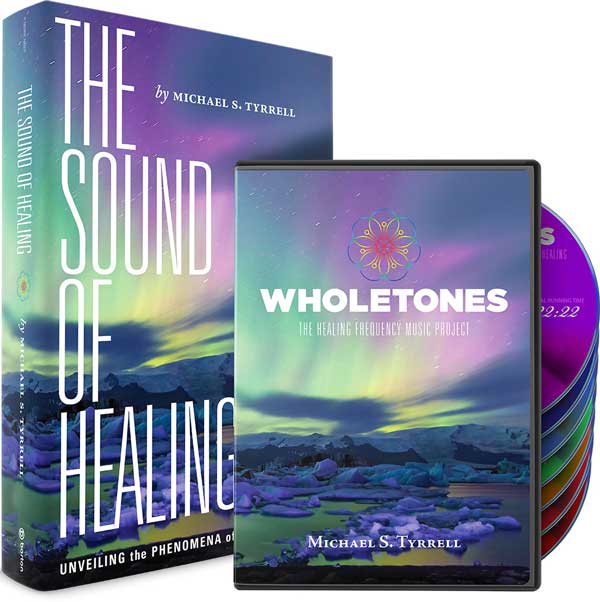Downloads are dreamy but CDs are far from dead, according to Marty Fahnke, head of marketing for specialty label Barton Publishing. Fahnke said he pumped out $10 million in sales in the 18-month period prior to Christmas, the majority of it physical media.
While Barton mainly sells health books, Fahnke has carved out a music niche, targeting customers 45-years-and-up with originally composed “meditation music.” His experience is instructive for anyone interested in creating music for a specific market. Fahnke himself seems somewhat surprised at the results.
Wholetones: The Healing Frequency Music Project features 3.5 hours of music composed by Christian musicmaker Michael Tyrrell. Fahnke direct markets it as a $49 digital download, but when customers visit the Barton website to collect the download they’re apprised that they can, after they’ve sampled the music, upgrade their purchase to a $99 package that in addition to the MP3 file includes a seven-CD set and a book documenting how the music was created.

The book and seven-CD set are priced at $99. (Photo courtesy Barton Publishing)
Fahnke said 82% of his customers — in the neighborhood of 75,000 to 80,000 people — bumped up to the more expensive offering. “As direct marketers we can test a lot of configurations. Initially we offered just digital. When we offered just the physical CDs, sales increased, but when we offered the CDs plus the digital, sales skyrocketed. The MP3 downloads became something that people could listen immediately, and have something to play until the CDs arrived.”
Fahnke said his audience skews about 60% female. He thinks one factor in the company’s sell-through success is that the customer base is older and more economically stable. He also gives a lot of credit to the marketing efficacy of Facebook Business. The company initially marketed its music to existing partners and customers via email lists, then branched out to radio and Facebook.
“Sales were good from the outset, but once we started using Facebook things started taking off like crazy. The thing about Facebook is, once you have a customer base, they help you find what they call ‘lookalike customers,’ which are people who have very similar profiles and interests. Facebook is not really as much a social media company anymore as it is a marketing company. If you want to reach a 53-year-old woman with two dogs that drives a certain kind of car, Facebook can find that for you,” Fahnke explains.
Asked about Facebook’s affordability vis-a-vis the results, Fahnke said, “It’s a good value. As a direct marketing company I know exactly how much I’m spending every day, so the answer is yes, it’s affordable. But the next question is ‘Is it easy?’ And the answer to that is no. Once you cross the threshold of spending $10,000 a day it gets very complex. It takes a high level of sophistication because of all the rules Facebook tacks on. They have more rules than any advertising firm I’ve worked with, and they add new ones every day. So you constantly have to be tweaking the campaign.”
Fahnke said the sales profile shifts, but at the time of this interview he estimated that about 50% of the Wholetones sales have been generated by Facebook, 25% through email marketing and 25% through affiliate marketing, search engine marketing and other things. The company also uses Pinterest and Instagram. “For us, word of mouth is incredibly important and has been very strong.”
Buoyed by the consumer response, Barton is rolling out domestic TV ads this year and also expanding to the international market. “We feel $10 million is the tip of the iceberg,” he said, citing other direct response phenomena, such as Razor & Tie’s Kidzbop — pop songs performed by kids and targeted to tweens — and the “Now..” series: Now That’s What I Call Country, Now That’s What I Call Pop, etc… “Those are also heavily skewed to CDs,” Fahnke said. “Up to this point we’ve done no specific international marketing or promotional whatever, and 13% of our sales is foreign markets, and 8% of that is Australia.”

Barton Publishing marketing maestro Marty Fahnke.
The South Dakota-based Barton Publishing has been in business 10 years, but has only been in the music business since 2014. “Music has become our No. 1 best-selling product very quickly. The best thing about is we have literally thousands of testimonials coming back from our customers about what our music has brought to their lives: stress relief, PTSD alleviation, a soothing influence on kids.” Tyrrell, he said, records all the music using live performers (as opposed to synth sounds). “He uses a core group of five musicians, including a guitar, a harp and a Mongolian fiddle — also called a horsehead violin. It’s a very unique sound.”
It was Tyrrell who came up with the Wholetones Healing concept — centering on the idea that certain frequencies have healing powers — and pitched it to Barton. A Wholetones Christmas got off to a strong start, selling 2,000 CDs the first day on the market. Last year the company also produced Wholetones live concert event in New Mexico that Fahnke characterized as a success. “There were a lot of young people there, too, which was interesting.” It remains to be seen whether the younger crowd will become purchasers, and if so, what format.
“The fact remains there is this cry over the death knell of the CD format, but there is this whole group of baby boomers out there who prefer CDs. The younger crowd might prefer downloads. Our strategy leveraged both. So the takeaway for people in the music business is don’t offer one or the other, offer both.”


Comments are closed.